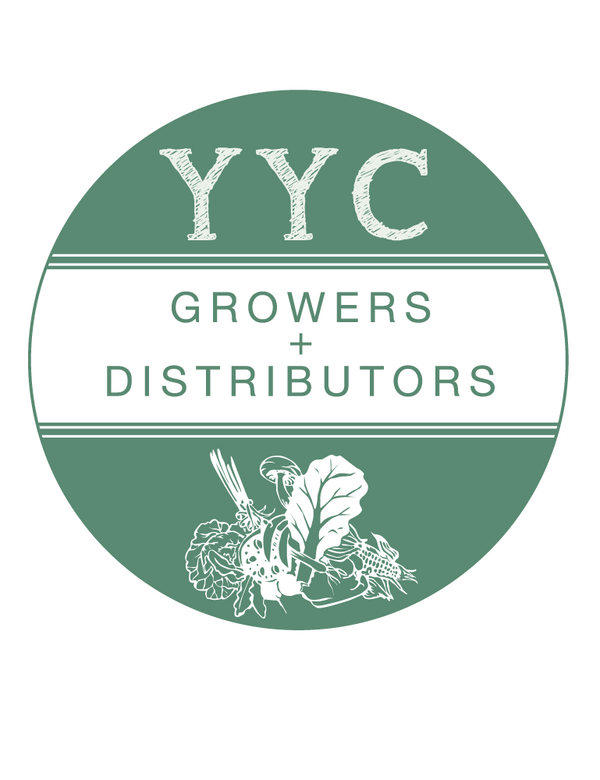We pride ourselves in being not just sustainable but, even more importantly, regenerative. The regenerative farmer is guided by this question, “Is my soil better this season than last?” The key impacts of asking this question are that the soil’s produce is more nutritious and flavourful, and the environment gets taken care of.
Simply put, the future of our food system is at stake. As we face climate crisis and an ever-growing population, we must change how we farm if we want to ensure that everyone has access to healthy, nutritious food. Regenerative agriculture offers a sustainable way forward for farmers and consumers alike--one that can help create a healthier and more resilient food system.
Communities vote for their future with the dollars they spend. By purchasing through YYC Growers, you provide a reliable market for small-scale local farmers and producers who are working to reshape and reinvigorate our current system of industrialized agriculture.
We are proud to offer a wide range of products from farmers who practice regenerative agriculture. From fresh produce to grass-fed beef, we are committed to providing our customers with the best in sustainable, nutritious, and seriously delicious food.

WHAT IS REGENERATIVE AGRICULTURE?
Regenerative agriculture is a holistic approach to farming that focuses on improving soil health, increasing biodiversity, and enhancing ecosystem services. It is a way of farming that not only sustains the land, but also regenerates it, leaving it better than it was before.
The goal of regenerative agriculture is to create a self-sustaining ecosystem in which the soil is healthy and alive, and the plants and animals thrive. This is achieved through the use of practices such as cover cropping, crop rotation, reduced tillage, and the use of natural fertilizers and pest management techniques.
Regenerative agriculture also involves the integration of livestock into the farming system, which helps to improve soil health and increase biodiversity. By using animals to graze on cover crops and other vegetation, farmers can improve soil health and reduce the need for synthetic inputs.
Some of our farmers that incorporate livestock are Happiness by the Acre and Little Loaves Farm (interview linked below), among others.
BENEFITS
The benefits of regenerative agriculture are numerous. By improving soil health, farmers can increase crop yields, reduce erosion, and improve water quality. Additionally, regenerative agriculture can sequester carbon in the soil, helping to mitigate climate change.
For consumers, regenerative agriculture means healthier food. Studies have shown that fruits and vegetables grown using regenerative practices have higher levels of nutrients than those grown using conventional methods. Additionally, by supporting regenerative agriculture, consumers are supporting a more sustainable food system.

NON-REGENERATIVE AGRICULTURE
Non-regenerative agriculture practices are those that focus on maximizing short-term profits at the expense of long-term sustainability. These practices often involve the heavy use of synthetic fertilizers and pesticides, which can lead to soil degradation and water pollution. Non-regenerative agriculture also relies heavily on tillage, which can disrupt soil structure and lead to erosion.
Another common non-regenerative practice is monoculture farming, in which a single crop is grown year after year on the same plot of land. This can lead to a decrease in soil health and biodiversity, as well as an increase in pest and disease pressure.
Non-regenerative agriculture practices can have significant negative impacts on the environment, as well as on the health and well-being of farmers and consumers. In addition to soil degradation and water pollution, non-regenerative practices can lead to increased greenhouse gas emissions and contribute to climate change.
FOR THE FUTURE
Overall, regenerative agriculture is a sustainable and holistic approach to farming that can help to create a healthier and more resilient food system.
Our farmers work hard to regenerate soil health and sequester carbon through a variety of methods: no till, cover crops, adding organic matter—and more. All farms have different methods to enact the best growing practices for their particular context. Of course, YYC Growers puts transparency first, and we want our customers to know how their food is grown.
Visit the Our Farmers page to learn more about our farmers and their regenerative practices.
Share your feedback with us! Comment on our Facebook or Instagram feed or send us an email at info@yycgrowers.com
Your YYC Growers Team

